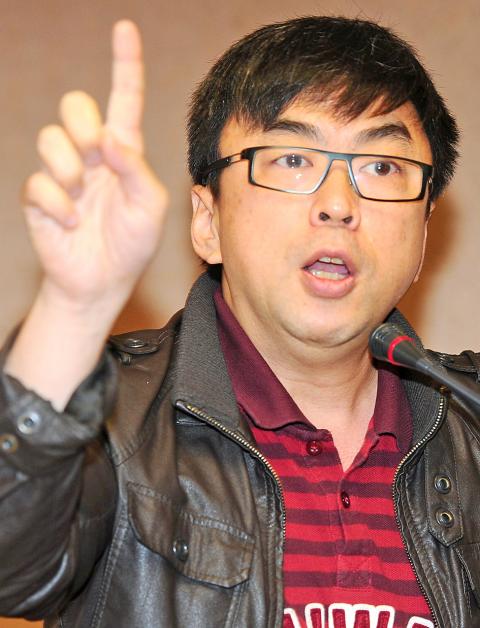Democratic Progressive Party (DPP) legislators yesterday criticized the Mainland Affairs Council (MAC) for listing information on the disadvantages of the cross-strait service trade agreement as classified and releasing only information it considers favorable to the agreement.
Although President Ma Ying-jeou (馬英九) has repeatedly said that approving the service trade agreement will have more advantages than disadvantages for Taiwanese businesses, DPP lawmakers said the government seems to be hiding certain information that may show the agreement in a disadvantageous light.
“In 2011, before the agreement was signed, the government commissioned the Chung-Hua Institution for Economic Research to conduct research on the pros and cons of the agreement. The results of that research show that the agreement may lead to the loss of key technologies, stronger competition from China and loss of business ownership,” DPP Legislator Tuan Yi-kang (段宜康) said during a question-and-answer session at a meeting of the legislature’s Internal Administration Committee.

Photo: Chang Chia-ming, Taipei Times
“That information has been listed as classified and has been hidden from the public,” Tuan said.
In addition, an assessment report on the pact submitted by the National Security Bureau (NSB) concluded that opening the telecommunications industry to China may threaten Taiwan’s national security, but that report has been classified, the lawmaker said.
Tuan also accused the council of hiding poll results that showed 62.9 percent of respondents supported a call by activists who occupied the Legislative Yuan from March 18 to April 12 for the agreement to be renegotiated, and only 23 percent were opposed to it.
“I could understand if you decide to hide information about something advantageous to us during negotiations for the trade pact, but why are you trying to hide from the public what is bad for us?” Tuan said.
“It is also questionable why you are only releasing poll results that are favorable to the government’s stance,” Tuan said.
DPP Legislator Lee Chun-yi (李俊俋) asked similar questions.
“I could understand that you may want to hide some information during talks on the trade pact, but it does not make sense that it is still classified now that the pact has been signed,” Lee said.
Responding to the questions, Mainland Affairs Council Minister Wang Yu-chi (王郁琦) said that the classified information was to be used for reference only within the government.
“We never intended to release the information to the public,” he said.
Wang also said that there was much more undisclosed information showing advantages of the service trade agreement than showing the disadvantages, “but since this data is also for internal reference, we have not released that information either.”
Deputy Minister of Economic Affairs Cho Shih-chao (卓士昭) said that research produced by academics is only used for internal reference for decisionmaking.
“Academic research is not the only reference used; we also have to talk with business leaders before making a final decision,” the deputy minister said.
However, neither official explained why some poll numbers have been released to the public, while others were not.

DEFENSE: The National Security Bureau promised to expand communication and intelligence cooperation with global partners and enhance its strategic analytical skills China has not only increased military exercises and “gray zone” tactics against Taiwan this year, but also continues to recruit military personnel for espionage, the National Security Bureau (NSB) said yesterday in a report to the Legislative Yuan. The bureau submitted the report ahead of NSB Director-General Tsai Ming-yen’s (蔡明彥) appearance before the Foreign and National Defense Committee today. Last year, the Chinese People’s Liberation Army (PLA) conducted “Joint Sword-2024A and B” military exercises targeting Taiwan and carried out 40 combat readiness patrols, the bureau said. In addition, Chinese military aircraft entered Taiwan’s airspace 3,070 times last year, up about

A magnitude 4.3 earthquake struck eastern Taiwan's Hualien County at 8:31am today, according to the Central Weather Administration (CWA). The epicenter of the temblor was located in Hualien County, about 70.3 kilometers south southwest of Hualien County Hall, at a depth of 23.2km, according to the administration. There were no immediate reports of damage resulting from the quake. The earthquake's intensity, which gauges the actual effect of a temblor, was highest in Taitung County, where it measured 3 on Taiwan's 7-tier intensity scale. The quake also measured an intensity of 2 in Hualien and Nantou counties, the CWA said.

The Overseas Community Affairs Council (OCAC) yesterday announced a fundraising campaign to support survivors of the magnitude 7.7 earthquake that struck Myanmar on March 28, with two prayer events scheduled in Taipei and Taichung later this week. “While initial rescue operations have concluded [in Myanmar], many survivors are now facing increasingly difficult living conditions,” OCAC Minister Hsu Chia-ching (徐佳青) told a news conference in Taipei. The fundraising campaign, which runs through May 31, is focused on supporting the reconstruction of damaged overseas compatriot schools, assisting students from Myanmar in Taiwan, and providing essential items, such as drinking water, food and medical supplies,

Taiwan is stepping up plans to create self-sufficient supply chains for combat drones and increase foreign orders from the US to counter China’s numerical superiority, a defense official said on Saturday. Commenting on condition of anonymity, the official said the nation’s armed forces are in agreement with US Admiral Samuel Paparo’s assessment that Taiwan’s military must be prepared to turn the nation’s waters into a “hellscape” for the Chinese People’s Liberation Army (PLA). Paparo, the commander of the US Indo-Pacific Command, reiterated the concept during a Congressional hearing in Washington on Wednesday. He first coined the term in a security conference last